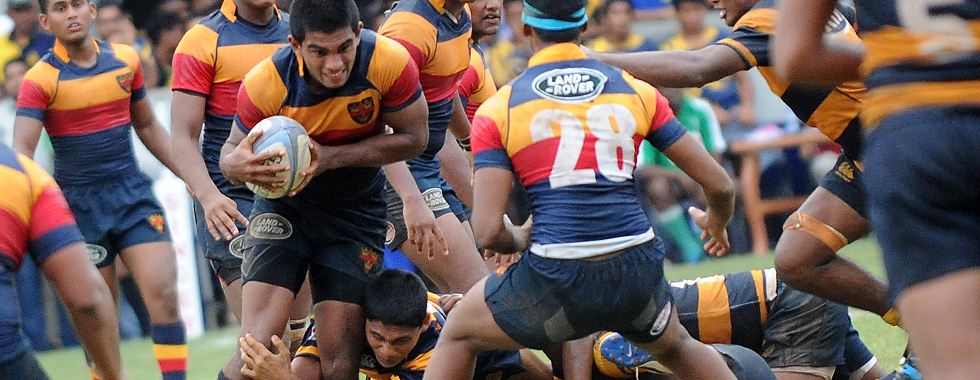More questions than answers
View(s):As schools rugby reaches the last stages of the league there is much talk on what can happen despite the league taking a break. The tasks ahead for the teams in the final stages are not easy as the expectations are high. It is at this point that stress and tension are bound to rise. Some are placed better than others to have a hope of laying their hands on the cup. Those whose chances of seeing the cup at their home are slim expect to salvage at least a part of the loss prestige. So far in the league the tradition and rivalry has been among a few schools game such as the Bradby, and Royal vs. Isipathana games. Now it is building up. In the weeks to come it will be  more on edge as it is not only the league that is available for the ask but also other traditional games that have seen tense rivalry. What irks me most is the comments that I hear from a number of godfathers who talk in terms of the money they have spent and the lack of results. This leads to off-field pressure from a number of stakeholders and sometimes can be a burden to the players as well as the referees. I have had conversations with parents who worry wondering whether playing the game is that worth.
more on edge as it is not only the league that is available for the ask but also other traditional games that have seen tense rivalry. What irks me most is the comments that I hear from a number of godfathers who talk in terms of the money they have spent and the lack of results. This leads to off-field pressure from a number of stakeholders and sometimes can be a burden to the players as well as the referees. I have had conversations with parents who worry wondering whether playing the game is that worth.
The pressure to perform comes from sources outside the field and increases when it comes to a much touted traditional match as well as a match that is among two long standing rival teams. Pressure comes from those who find the money to spend on a team. Pressure comes from coaches who have to retain their position in the team as well as maintain a status quo that is associated with their name. The pay is high and the sponsorship is high and the KPI is to ask for wins.
The psychology of any sport or competitor is extremely complex and where school boys are concerned it is a delicate situation. During a season the young athlete requires the guidance of many different identities. The coach and others involved need to be a teacher, trainer, psychologist, disciplinarian, friend, planner, motivator, communicator and the list goes on
While incorrect combinations and not-so-good game plans result in failure the onus is passed to the players and referred to as a lack of attitude. This is because of the frustration of not seeing results in relation to the money spent. Heard from the grapevines of the business world is the number of schools that are looking for sponsors for next year and it has started young. What worries those in the field is not that it has started early but the sums that are asked. Some of the expectations of the top schools are around or over 25 million rupees a year. If somebody spends this amount of money it is natural to expect a lot. The question I have to ask is whether  those involved in the schools are evolving more towards a short term and quick rewarding system favouring marketing and merchandising rather than long term need of the child who needs a sport as part of their curriculum. With money comes a load of pressure for the boys. That can get the whole scenario into a predicament when the goals are different. Schoolboys want to enjoy the game and a win is a chink in their amour.
those involved in the schools are evolving more towards a short term and quick rewarding system favouring marketing and merchandising rather than long term need of the child who needs a sport as part of their curriculum. With money comes a load of pressure for the boys. That can get the whole scenario into a predicament when the goals are different. Schoolboys want to enjoy the game and a win is a chink in their amour.
There seem to be parents who are worried on the high expectation and pressure brought on their children that are not helping to enjoy the game. Is this game for the benefit of the children or to satisfy the expectation of adults who perhaps think that having been past pupils have a right to expect more in the name of being ardent old boy.
In this endeavor for success are the schoolboys being driven through a range of motor skills? That is the practice of a sequence of movements and drills that is expected to produce a smooth, efficient action on the field and expect to get to the goal line. Creativity and enjoyment does not come into the equation and when it is absent the idea of enjoyment is lost.
The path to excellence is universal. To follow it is wisdom, but there will be challenges along the way where many will fail mainly because of these two major reasons: attitude and commitment. Despite the best of intentions the boy will be lazy thinkers during practice. Give him 100 kicks at goal or a 100 passes or an equal number of preplanned drills the tendency will be to go auto pilot and the brain goes to sleep. You don’t then do it in a game and blame the player with choice words “lack of attitude”. Get them to be creative and have the freedom to enjoy the game you will find the results. Suppose that answers a question that parents have asked: what do we do to motivate the boys.
I quote Arthur Ashe, a Tennis star: “Perhaps I was even more pleased by the way I had played than by my results in terms of wins and losses, or even in terms of prize money. I had done nothing, through scandal or bad behavior, to bring the game into disrepute. And I was also proud that fans and other players had found my game adventurous.”
Vimal Perera is a former Rugby Referee, coach and Accredited Referees Evaluator IRB


